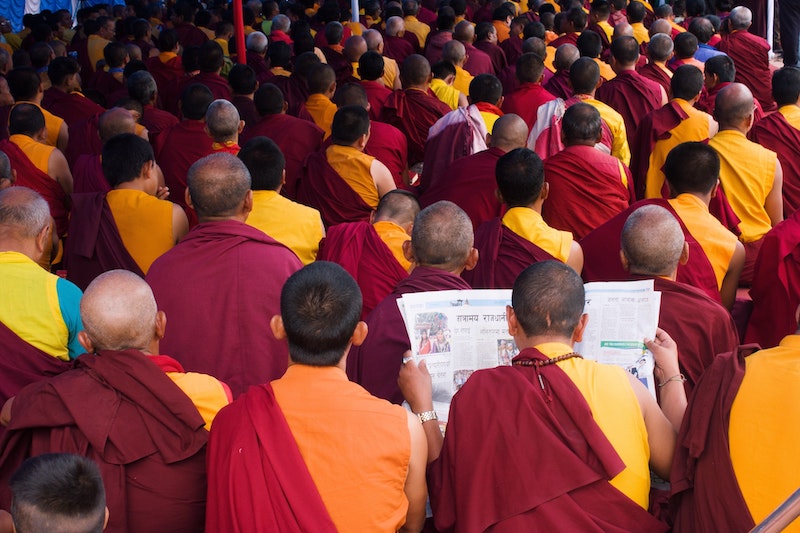Hongaku is a Japanese word that translates to “original enlightenment”. This teaching, which states that all people, animals, and inanimate objects are already enlightened originated in medieval China, and first appears in the Avatamsaka (Flower Garland) Sutra.
The teaching became popular in Japan during the Kamakura period (1185-1333) appearing in the Platform Sutra of Huineng (The Sixth Patriarch).
And while they expressed the teaching in different ways, prominent Buddhist teachers like Dogen (Soto Zen), Eissai (Rinzai Zen) and Shinran (Pureland Buddhism) made Hongaku a key part of their Buddhist doctrine.
Despite this doctrinal backing, however, the teaching of original enlightenment is a hard pill for most people to swallow. In my own experience, when I tell people that they’re already enlightened they sometimes respond by either insisting they’re a terrible person or saying something along the lines of, “Yeah, I know we’re all “enlightened,” but how how do I get ENLIGHTENED.” The implication, of course, is that everyone is equal, but some people are more equal than others.
The end result of this flawed thinking is that Buddhist practice becomes a cheap status symbol. The only difference being that instead of competing with our neighbor based on our car or bank account , we compete on the basis of awakening. Questions like who’s been practicing longer, who has the most impressive lineage, and who can sit in a full-lotus are all common inquiries in the, “Who’s more enlightened?” game that plays out on-line and in sanghas across the United States.
A good understanding of Hongaku serves to stop all of this. It teaches us that the purpose of practice isn’t to become spiritual super people. Rather, it’s to remind us of our already enlightened nature.
Of course this begs the question, “If we’re already enlightened, why do we need to practice Buddhism?” An easy way to think of it is to imagine that our enlightenment is a beautiful, sunshine-filled day and our mind is a window that collects dust.
The sun is always shining, but if we want sunlight to come into our homes, we need to make sure that our windows are clean. Otherwise, the dust covered windows won’t allow any light to enter the house. Similarly, our enlightenment is always present, but if our minds are filled with delusions, that enlightenment can’t manifest in our daily lives.
This is why meditating and keeping the precepts are so important. These practices clean our window-minds and allow our enlightenment to enter the world.
This is a beautiful, empowering teaching that can benefit many people. Unfortunately, it’s also an insulting teaching if we approach it with a mind of delusion. It tells us that criminals are enlightened just like saints. And it implies that we can adhere to every syllable of the teachings without gaining anything permanent or lasting.
This is a problem because the deluded mind needs to feel special in a way that others aren’t. And if everyone is enlightened, then enlightenment stops being special. But this is only a problem for the deluded mind. In fact, the three teachers that I mentioned earlier all encouraged their students to treat the practice as “nothing special.”
Dogen went so far as to say the act of seated meditation was enlightenment itself. And Shinran stated that we only need to place our faith in Amitahba (The Buddha of Infinite Light) in order to reach the Buddhist Pureland. Thus, enlightenment stops being a question of attainment. Instead it’s a simple question of practice. And if we practice enlightened behavior, we’ll return to our true nature, which is already enlightened.
So, let’s practice hard, my friends, and let our enlightened natures shine!


Interesting. I had previously thought of the Chinese phrase as meaning “enlightened at-root” or “basically enlightened”, which somehow seems easier for me to make sense of. However, I checked some dictionaries and “original enlightenment” does seem to be the accepted translation – so I was wrong! Although I suppose the difference is not great.
Dogen Zenji said that to studied Buddhism is to study the self. To study the self is to forget the self. The Dharma teaches there are two truths conventional truth and ultimate truth. To say me mine we, us this is all the realm of conventional truth. To say all beings already are in enlightenment is to say they have the Buddha nature. Is saying that the practice of enlightenment is a subtractive process not and accumulation of virtue, spiritual attainment and so forth. As a person practices they learn to let go of the detachment to thoughts, ideas and things all the realm of conventional truth. By doing so the mind begins to dwell in its original state where there is no separation of subjective and objective, no separation of self and others. But even in the deepest of enlightenment a dog is a dog and a cat is a cat. When you understand this truly you no longer have need for the word dog or cat. To say form is emptiness and emptiness is form means the world’s exists in interdependence. The most obstructive delusion is that we have to attain enlightenment. It is like a man who is looking for his glasses and they are still on his nose.